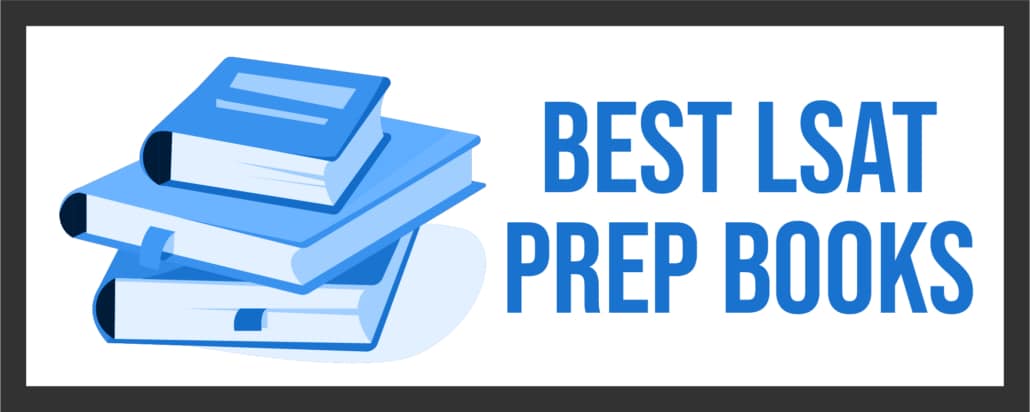
What’s a law student’s favorite part of a roller coaster?
The curve on the final exam!
Tee hee. We kid. But if you want to avoid depending on a curve and ace the Law School Admission Test (LSAT) all on your own, you’ll need the best LSAT prep books for study time.
According to the Law School Admission Council, over 100,000 hopefuls take the LSAT every year. But only .01% achieve a perfect score of 180, proving that it’s a challenging test, to say the least.
But with the right resources, you can turn this hurdle into a stepping stone toward your law school journey. LSAT prep books provide comprehensive content, proven strategies, and realistic practice tests that mirror the actual exam.
This article will dissect everything you need to know about LSAT prep books, and why they’re your trusty companions in the quest for a stellar LSAT score. So let’s get started, shall we?
Why You Need LSAT Prep Books
Success in the LSAT is not merely a matter of intelligence or general academic prowess. It’s about familiarity with the specific structure and demands of the test, understanding the types of questions asked, and mastering the most effective strategies for answering them. LSAT prep books are uniquely designed to provide this training. Usually included with LSAT prep programs, these books can help you go from a decent LSAT score to a great one.
Types of LSAT Prep Books
Not all LSAT prep books are created equal. There are different types designed to meet diverse needs. Understanding the different types of LSAT prep books and their purposes is the first step in choosing the right resources for your needs.
- Comprehensive Overview Books: Provide a complete guide to all sections of the LSAT and are good for beginners.
- Section-Specific Books: Focus on individual sections like Logical Reasoning, Analytical Reasoning, or Reading Comprehension and are perfect for students looking to target weaknesses in specific areas.
- Question-Type Specific Books: Break down different question types found within sections. These are suitable for those needing to master particular question formats.
-
Advanced Strategy Books: Offer high-level techniques for scoring well on the LSAT and are targeted at those aiming for top percentiles and have a solid understanding of the basics
Other types of LSAT study books include:
-
Practice Test Books: Contain full-length practice exams and questions and are excellent for simulating real test-taking conditions and tracking progress
-
Supplemental Material Books: Provide additional exercises, tips, and insights and are great as add-ons to regular study materials for further enhancement
-
Quick Review and Cheat Sheet Books: Summarize key concepts and shortcuts and are ideal for last-minute review or quick reference during study sessions.
Features of High-Quality LSAT Prep Books

A high-quality LSAT prep book should be more than just a collection of practice questions. It should provide in-depth explanations, strategic advice, and opportunities for realistic practice. It should also be up-to-date, accurately reflecting the current structure and content of the LSAT. Here, we’ll delve into these features and others that characterize the most effective LSAT prep books on the market.
Best LSAT Prep Books Reviewed
Choosing the right LSAT prep book can seem like a daunting task, but it’s essential for success on the test. To help you make an informed decision, we’ve highlighted some of the best LSAT prep books available.
Each of these resources has its unique strengths, and they all have one thing in common: they have been praised by students for their effectiveness in LSAT preparation.
1. The Official LSAT PrepTest Series
Published by the Law School Admission Council (LSAC), the creators of the LSAT, this series offers the most authentic practice tests available. Each book contains actual past LSAT exams, which means you’ll get to experience the real test structure, content, and difficulty level.
Pros:
- Authenticity: The PrepTest Series is released by the LSAC itself, meaning you get to practice with actual past LSAT exams.
- Realistic Practice: It helps to familiarize you with the exact format, content, and difficulty level of the actual LSAT.
Cons:
- Lack of Explanation: These books provide real tests but don’t include detailed explanations for the answers.
- Costly: As there are numerous PrepTest books available, purchasing multiple volumes can be quite expensive.
2. LSAT Prep Plus 2020-2021 by Kaplan
This all-in-one guide by Kaplan is great for comprehensive LSAT preparation. It includes in-depth strategies for each section of the test, plus access to an online study plan and practice questions.
Pros:
- Comprehensive: It covers all areas of the test and includes in-depth strategies.
- Extra Resources: The book comes with access to an online study plan and practice questions.
Cons:
- Lacks Detail: Some users have noted that certain sections of the test are not covered in as much detail as they would like.
- Generic Strategies: Some of the test-taking strategies may be too generic and not specific to the LSAT.
3. The PowerScore LSAT Bible Trilogy
The PowerScore series consists of three separate books that cover each main section of the LSAT: Logical Reasoning, Logic Games, and Reading Comprehension. These books are known for their detailed explanations and strategies.
Pros:
- In-Depth: These books provide detailed explanations and strategies for each section of the LSAT.
- Breakdown: The separation of the books by section allows for focused study.
Cons:
- Expensive: Purchasing all three books can be costly.
- Time-Consuming: The depth of information in the books can be overwhelming and time-consuming for some students.
4. The LSAT Trainer by Mike Kim
The LSAT Trainer is a popular choice for its innovative and holistic approach to LSAT preparation. It’s particularly praised for its strategies on logic games and logical reasoning.
Pros:
- Holistic Approach: The book takes an innovative, comprehensive approach to LSAT preparation.
- Effective Strategies: Students have praised it for its effective strategies on logic games and logical reasoning.
Cons:
- Lack of Practice Tests: The book contains fewer practice tests compared to other resources.
- Format: Some students may prefer a breakdown by section instead of the holistic approach.
5. Manhattan Prep LSAT Strategy Guides
The Manhattan Prep series offers a comprehensive guide to each section of the LSAT. It’s known for its in-depth strategies and practice questions that closely mimic the real exam.
Pros:
- Comprehensive: The series covers each section of the LSAT in detail.
- Practice Questions: It offers practice questions that closely mimic the real exam.
Cons:
- Expensive: The cost of the complete series can be high.
- Less Suitable for Self-Study: Some students have noted that these books work best as a supplement to a course rather than for self-study.
6. The Loophole in LSAT Logical Reasoning by Ellen Cassidy
This book is a favorite among students struggling with the logical reasoning section. It offers a unique approach to identifying and addressing common patterns in logical reasoning questions.
Pros:
- Unique Approach: The book presents a unique way of identifying and addressing common patterns in logical reasoning questions.
- Effective for Strugglers: It’s particularly helpful for students who find the logical reasoning section challenging.
Cons:
- Narrow Focus: The book solely focuses on logical reasoning, so you’ll need additional resources for other sections.
- Learning Curve: The unique approach may take some time for students to grasp.
Remember, the best LSAT prep book for you depends on your individual needs and learning style. Consider what areas you need to focus on and how you best absorb information before making your choice.
LSAT Prep Books vs. LSAT Prep Courses: Which is Better?
You might be wondering, “Between LSAT prep books and LSAT prep courses, which one offers the most benefits?” While both resources can be combined for a comprehensive approach, let’s delve into why LSAT prep courses often come out on top for many students.
Structured Learning
One of the biggest advantages of an LSAT prep course is the structure it provides. Prep courses break down the test’s content into manageable sections and guide you through each one in a systematic way. This is ideal for students who struggle with self-discipline or don’t know where to start their LSAT prep.
Expert Guidance
Prep courses are typically taught by instructors who are not only LSAT experts, but also experienced educators. They understand the complexities of the test and can provide insider tips and strategies that may not be available in prep books.
Personalized Feedback
Unlike prep books, courses often offer opportunities for personalized feedback. Whether it’s through one-on-one tutoring sessions or class discussions, this interaction can provide invaluable insights into your strengths and weaknesses, and how to improve.
Realistic Practice
Many LSAT prep courses include full-length, timed practice tests under realistic conditions. This experience can be a more accurate reflection of the actual test environment than practicing with a book at home.
Continual Updates
Prep courses are continually updated to reflect changes in the LSAT. While most prep books are also updated, you might need to purchase new editions to get the most current information.
Interactive Learning
Prep courses often incorporate a variety of teaching methods, including video lessons, interactive quizzes, and group discussions. These engaging formats can make studying more enjoyable and effective, especially for visual or auditory learners.
While prep courses often come with a higher price tag than prep books, many students find that the benefits outweigh the costs. If you’re serious about achieving a high LSAT score, investing in a comprehensive prep course could be your best bet.
LSAT Prep Books vs. LSAT Tutors: A Comparative Analysis
In the journey of LSAT preparation, you might be contemplating, “Should I use LSAT prep books, or is it better to hire an LSAT tutor?” Both resources have their advantages, and while they can work great in unison, let’s explore why the best LSAT tutors often provide a superior edge.
Tailored Learning
An LSAT tutor provides a custom learning experience tailored to your specific needs. Unlike a prep book, a tutor can adapt the teaching method and content according to your strengths, weaknesses, and learning style.
Interactive Feedback
While prep books provide structured content, they lack the interactivity of a tutor. Tutors can provide real-time feedback, allowing immediate course correction and clarification of doubts that a book cannot offer.
Motivation and Accountability
Studying for the LSAT can be a daunting and lonely process. A tutor provides moral support, motivation, and holds you accountable, which can be crucial during this demanding period.
Focused Study
Tutors can help you focus on the most important areas and difficult sections. They can provide insight into the intricacies of the exam, while prep books tend to present a broad overview.
Strategy and Technique
A tutor can provide unique strategies and techniques that best suit your approach. This personalized learning method is something that generalized prep books might not be able to provide.
Thus, while LSAT prep books are an excellent resource for self-paced study and initial preparation, a tutor can provide invaluable benefits. They offer personalized, interactive, and dynamic learning that can enhance understanding, boost confidence, and potentially improve your LSAT score.
Conclusion
The right LSAT prep books can be your strongest allies in conquering the LSAT. Armed with the information and advice provided in this guide, you’re well-prepared to choose the resources that best fit your needs, and set yourself on the path to LSAT success.
Frequently Asked Questions
There isn’t a one-size-fits-all answer to this question as the best book depends on your individual learning style, areas of strength and weakness, and specific preparation goals. However, highly recommended titles often include the LSAT Prep Plus series from the Law School Admission Council and the PowerScore LSAT Bible series.
Yes, many students successfully self-study for the LSAT using prep books. These resources provide comprehensive content reviews, strategic advice, and practice questions that closely mimic the real exam.
The cost of LSAT prep books varies widely depending on the author, content, and publisher. You can expect to spend anywhere from $20 to $150 on a single book.
This varies depending on your starting point, target score, and how much time you can dedicate to studying each week. A common recommendation is to start studying 3-6 months before the test.
While older editions can still provide valuable practice, it’s generally best to use the most recent editions of LSAT prep books. This is to ensure that the material and practice questions accurately reflect the current structure and content of the LSAT.
The effectiveness of digital versus printed LSAT prep books largely comes down to personal preference. Some students prefer the tangibility and freedom from digital distractions that come with printed books, while others appreciate the convenience, portability, and interactive features of digital resources.

Bryce Welker is an unstoppable force in the worlds of business and education. He’s a dynamic speaker, expert blogger, and a regular contributor to top-tier publications like Forbes, Inc.com, Business.com, and AccountingToday.com. With a proven track record of founding over 20 innovative test prep websites, Bryce has helped countless students and professionals pass their certification exams and achieve their dreams. Whether you’re seeking career advancement or educational success, Bryce Welker is the ultimate guide to help you get there.




